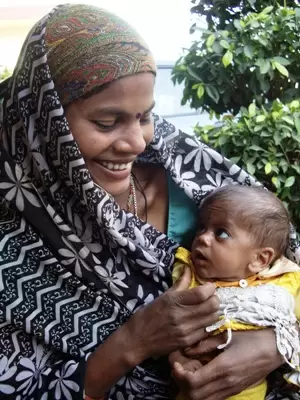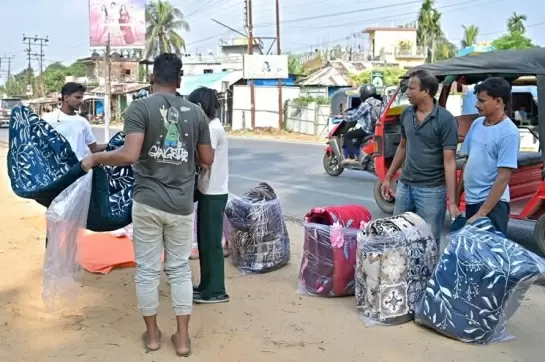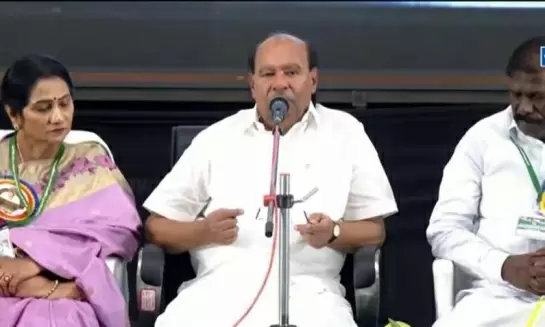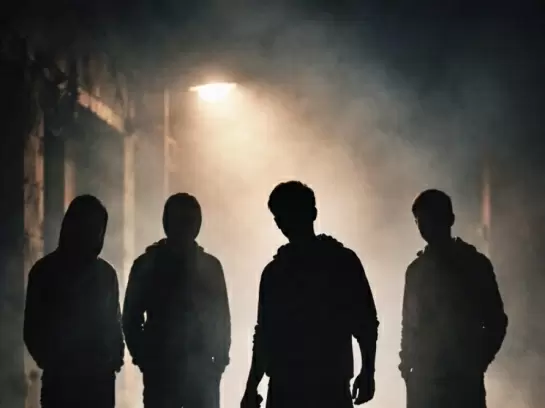PM’s remark that malnutrition is a national shame spurs action

13-April-2012
Vol 3 | Issue 15
Question: ‘What is malnutrition?’ Answer One: ‘Hmmm… is it when poor people don’t get food to eat?’ Answer Two: ‘I think it is something that happens in Africa.’ Answer Three: ‘Why do you ask this question? What has it got to do with me?’
A simple query posed randomly to educated youngsters in any Indian city would most likely draw such responses. One may argue that perhaps it’s only the prosperous urbanite, who is disconnected from an issue largely linked to poverty and lack of access to food.
 |
|
The need for a mass media campaign on malnutrition is the need of the hour and the good news is, Aamir Khan has a part in it (Photo: WFS)
|
But even those who lead impoverished lives themselves are often unable to understand what ‘kuposhan’ (Hindi for malnutrition) is all about.
Kranti, 22, hails from Katera village in Jhansi district, Uttar Pradesh. Illiterate, she came to Delhi recently to work as a daily wager. A new mother, she brings her seven-month-old daughter Radhika daily to the construction site.
Radhika weighs less than 2.5 kilos today. Ask Kranti why her baby is severely underweight, a sure sign of child malnutrition, and she says, “Most children in our village are like her. I was able to breastfeed for a month and then my milk dried up.
“It’s only when I came to Delhi that a local chemist told me that Radhika is extremely underweight. I give her powder milk now and that’s only because I have started earning and can buy it.”
According to the recent HUNGaMA (Hunger and Malnutrition) report, 42 per cent of children under the age of five are underweight – that is, nearly every second child in India is malnourished.
These dismal numbers may have driven Prime Minister Dr Manmohan Singh to call malnutrition a “national shame”, but there appears to be a glaring lack of public awareness – both in urban and rural India – about this critical, but complex, problem that has a direct impact on the country’s future.
According to ‘The Economist’, quoting the medical journal, ‘The Lancet’, malnourished children (all factors being equal) are less likely to go to school, less likely to stay there, and more likely to struggle academically.
Therefore, they will earn less than their better fed peers, live in poverty and have shorter life spans. Moreover, malnutrition is not just about under nutrition – common in rural areas – it can also cause obesity.
And India, in particular, has an obesity epidemic in cities, as processed food becomes easily available and people adopt a more sedentary lifestyle. Reasons enough for everyone to know more about malnutrition, isn’t it?
This is where a mass media campaign, slated to roll out soon, will play a prominent role. A core group, comprising the Citizens' Alliance against Malnutrition, the United Nations Children’s Fund (UNICEF), one of India’s biggest movie stars Aamir Khan, and poet-ad guru Prasoon Joshi, is working with the Government of India to design, produce and launch a campaign to alert and educate people in the simplest possible ways.
According to the UNICEF, “When two years ago the prime minister, in his Independence Day speech, first made the statement that malnutrition is a ‘national shame’, that was our starting point. Conversations around the need to give high visibility to the issue took place between the Citizen’s Alliance, the UNICEF, and the Ministry of Women and Child Development. Later, the Citizen’s Alliance also felt the need to involve creative people like Prasoon Joshi and Aamir Khan in this process and they were happy to join in.”
Eventually, by January 2011 a concrete game plan was in place after a meeting between all partners.
There were representatives from the Prime Minister’s Office and the Women and Child Development ministry, members of the Citizen’s Alliance, the UNICEF, Prasoon Joshi and his team from the advertising agency, McCann, and, of course, Aamir Khan, the public icon who will take the message to the masses.
All the agencies and individuals had their roles chalked out. The Citizen’s Alliance would provide key inputs and insights; UNICEF had to work on two fronts: engage with Aamir Khan – who had been appointed their Ambassador and was ready to contribute to the campaign in his new capacity – and the McCann Team to develop the creatives; Prasoon Joshi would head the creative process; Aamir Khan would be the face of the campaign; while the government was to anchor this mammoth public service exercise.
Over the last year, the team has worked hard to put this campaign into shape, which, as per the UNICEF, “chiefly focuses on why the first 1000 days, or first two years, of life, is so important. It will also look at the issues of mother’s health, nutrition, rest and well-being, and service delivery.”
Using print and television, radio spots and outdoor advertising, simple, yet, appealing messages – with “an urban-rural flavour” – will be put to parents, and other caregivers.
.webp) |
Here, Prasoon Joshi’s and Aamir Khan’s creative genius and mass appeal will be the clinchers. While this is certainly not Joshi’s first public service campaign – he’s been associated with the Pulse Polio and UN Millennium Goals for eradicating poverty campaigns, among others – Khan, one of the more socially aware individuals in the film industry, has also done his homework. As the UNICEF Ambassador “he has made every effort to fully understand the issue”.
Khan’s personal appeal promises to go a long way. Last November, when Delhi girl Parineeta Singh, 24, (name changed) saw a report in a daily newspaper that her favourite star was in the city for shooting, she got all excited.
The report talked about an ad campaign, entitled 'Kuposhan – Bharat Choro', which sees Khan telling children, something like, ‘In 1947 India got Independence, but it's 2011 and we've not got independence from kuposhan’.
Parineeta had not heard of ‘kuposhan’ but decided to look it up on the Internet. “The more I read, the more I was drawn to the subject. I had never thought that malnutrition was so widespread in India. One shocking statistic really blew my mind – nearly half of children under 5 in India are underweight, worse than some countries in sub-Saharan Africa. I think it’s great that Khan will talk about this; we all need to know.”
With two clear expectations of this campaign – firstly, to make sure that citizens of India understand what malnutrition is and, secondly, that when people see that part of the campaign, which talks about interventions such as exclusive breastfeeding or complementary feeding or the right nutritional practices for mothers, over time it will create a positive behavioural change – this is certainly the kind of response the campaign partners will be hoping for.
In a recent speech, the Prime Minister had pointed out that nearly 16 crore children in India are below the age of six. He went on to say, “In the years to come, these children will join our work-force as scientists, as farmers, as teachers, as data operators, as artisans, as service providers. The health of our economy and society lies in the health of this generation.”
This really is about the future. If the media campaign on malnutrition can have its desired impact, perhaps little Radhika will have a fighting chance to live a healthy and productive life. - Women's Feature Service














